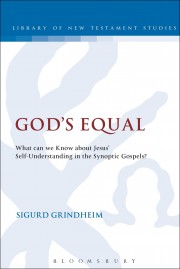A Brief Book Summary from Books At a Glance
About the Author
Sigurd Grindheim teaches New Testament at Fjellhaug International University College, Norway.
Introduction
This book is a scholarly study that examines the Synoptic Gospels to determine what Jesus thought about his own identity and nature. Grindheim argues that Jesus’ claims and teachings demonstrate that he identified himself as equal with God. Grindheim goes further than many works on Christology by exposing how often Jesus implicitly lays claim to equality with God. He builds a comprehensive, cumulative case for his thesis. This book probes key Christological teachings, actions, and backgrounds to help uncover a new layer of support for a high Christology. Jesus laid claim to titles and functions that were reserved for God alone.
Grindheim devotes a lot of space to arguing for the authenticity of the sayings and pericopes that he examines. This is of critical importance to his thesis (since a skeptic can no longer simply dismiss the evidence as “unauthentic” or “a creation of the early church”). What emerges is a carefully researched and argued scholarly thesis. Due to the nature of this material, however, it will not be summarized in the following summary. The style of argument is too finely grained to be summarized with any justice, and it would be unhelpful to continue to report that Grindheim argues for—and accepts—the authenticity of the Synoptic material.
Table of Contents
Introduction
Chapter 1
God’s Victorious Intervention: Jesus and the Kingdom of God
Chapter 2
Doing the Works of God: Jesus’ Miracles
Chapter 3
God’s Pardon: Jesus and Forgiveness
Chapter 4
Passing God’s Judgment: Jesus as the Eschatological Judge
Chapter 5
Speaking with God’s Authority: Jesus and the Law
Chapter 6
Issuing God’s Call: Jesus’ Relationship to His Disciples
Chapter 7
God’s Epithets: Jesus’ Metaphorical Self-Descriptions
Chapter 8
Mediatory Figures in Second Temple Judaism
Chapter 9
The Unique Son of God: Subordinate and Equal
Chapter 10
Jesus as the Son of Man
Chapter 11
God’s New Temple
Conclusion
Bibliography
Summary
Chapter 1
God’s Victorious Intervention: Jesus and the Kingdom of God
Jesus’ teaching about the kingdom of God reveals that Jesus equates his own presence and work with God’s rule. He is not merely God’s spokesman. In the Old Testament the idea that Yahweh is king is pervasive. The king of Israel was God’s representative, but because of sin and failure, no king perfectly fulfilled his responsibility. The Old Testament looked forward to a future day when Yahweh would come and set up a kingdom that was worldwide. An entirely new age and order would begin and God’s enemies would be defeated. These same themes continue to be sounded in Second Temple Judaism, but there is also some theological development during this time period. A key theme in both the Old Testament and in Second Temple Judaism is that it is God himself who will act decisively to bring about this new reality and kingdom.
Jesus’ teaching about the kingdom contains both present and future aspects. Jesus casts out demons because of God’s rule — the exorcisms demonstrate that God is already ruling. The same truth is seen through other signs and demonstrations of God’s present power. Yet the kingdom is also future: it is already here but advancing towards consummation and fullness. Jesus’ claims in connection with the kingdom show that he is not acting as a messianic intermediary — he is acting as God. The pericope in Luke 11:17-23 contains the claim of Jesus that he is driving out Satan, and that Satan is driven out by the finger of God (cf. Exodus 8:15; 31:18). Jesus equates his own work with the finger of God. Jesus takes credit for his exorcisms and performs them by his own power, and he equates his power with God’s power. Jesus also describes himself as the one who overpowers Satan, equating himself with the Divine Warrior. Only God can capture and bind Satan, and this is what Jesus claims to do. Human beings do not fight in this cosmic battle: Jesus claims to be fulfilling the role that God himself plays. Jesus is not merely saying that God’s power is at work in and through him—he is claiming to be God. The kingdom and the new creation come through Jesus….
The remainder of this article is premium content. Become a member to continue reading.
Already have an account? Sign In
Buy the books

God's Equal: What Can We Know About Jesus' Self-understanding In The Synoptic Gospels